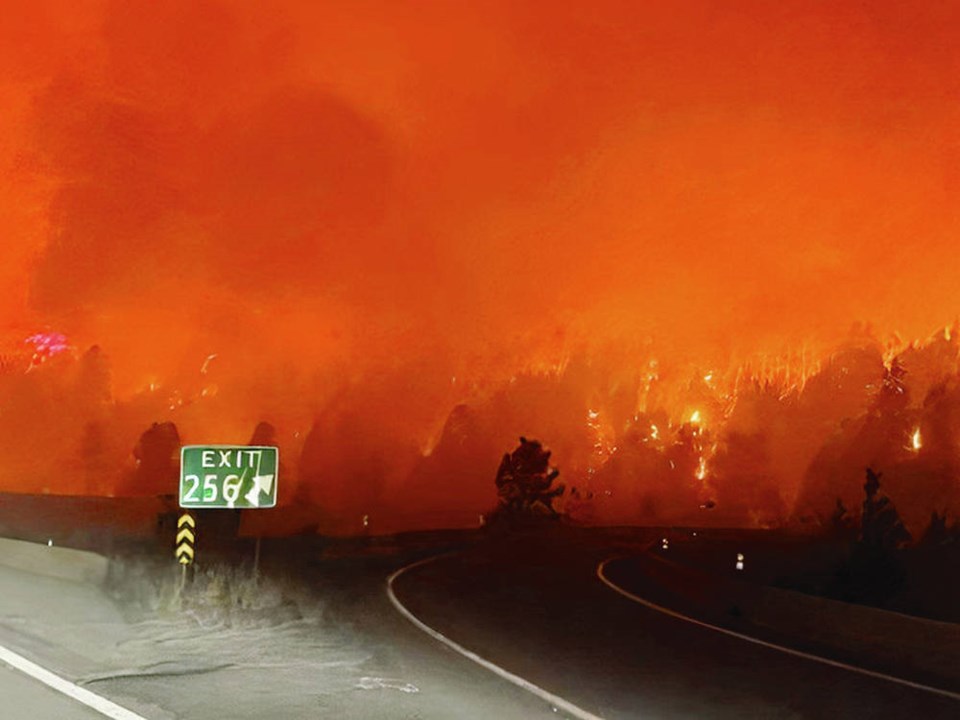Wildfires have caused heavy damage to dozens of properties in B.C.’s southern Interior and entire communities are on evacuation alert as gusting winds worsened fire conditions during the weekend and on Monday.
The White Rock Lake wildfire has caused significant damage to up to 60 properties, Laura Wilson, with the Regional District of Central Okanagan, said Monday.
Social media posts reported the losses included the Little Kingdom, a landmark pit stop near Vernon that included a gas bar and a store that sold everything from fresh baking to clothing and hardware.
Wilson said the White Rock Lake fire damaged rural properties, vacation houses and homes along Okanagan Lake.
The entire cities of Armstrong and Merritt are on evacuation alert, along with the community of Barriere, north of Kamloops, affecting about 14,000 residents in total. Residents of roughly 700 properties on the southwest side of Kamloops have also been told to be ready to leave.
Emergency support services are struggling to find places to house evacuees.
“Kelowna is at capacity with respect to hotel rooms,” Central Okanagan emergency operations director Brian Reardon told reporters Monday. “We are exploring other options including mass housing, however COVID-19 protocols are impeding our efforts in that respect, so we are looking further south and west of Kelowna.”
The City of Penticton activated an evacuee reception centre on Sunday night and cots were laid on the floor of Mount Boucherie Secondary in West Kelowna.
About 1,000 people were displaced by the Mount Law fire in Glenrosa on Sunday night, adding to the thousands already out of their homes due to the White Rock Lake wildfire.
The Walmart parking lot in West Kelowna was filled with evacuees’ campers and RVs.
“We got out early because last time in 2009, when the other fire hit, up above Gorman’s Mill, we got evacuated and it was pretty scary trying to get out with all the traffic backed up,” said Glen Levanen, who was camping the Walmart lot. “The flames were actually right beside the road and the trees were spontaneously combusting, it was brutal. There were people all over the road. It was just chaos and I didn’t want to go through that again.”
His home is just below where a fire is burning and he’s hoping crews will get the upper hand.
“I’ve built some of the air tankers right now that are bombing the fire. I work as an aircraft mechanic out at the airport, so I know … it’s risky what they do for a living and I appreciate what they do.”
Other evacuees have not experienced anything like this before.
“In the afternoon, we saw the fire coming up over the mountain, we saw the smoke,” said Daniel Hildenbrand, a recent arrival from Chilliwack. “We had already had some stuff prepared in the event that this happened. My family is new to the Okanagan. We moved up here about two years ago, so we haven’t really had any fire experience yet.
“We were all prepared-ish, but once you get that ten-minute notice you’re kind of put into high gear to get out of there. It was very coordinated with the first responders being on the scene directing everybody, and it was very efficiently run I thought.”
DriveBC, the online traveller information system, said the Coquihalla Highway between Hope and Merritt remains closed until further notice after flames cut the route late Sunday.
Forests Minister Katrine Conroy said nearly 7,700 square kilometres have burned since the start of the fire season.
Strong winds late Sunday fanned many of the nearly 270 fires burning in B.C., including about 30 that are considered highly visible or a threat to life and property.
Conroy described the conditions as “some of the toughest” the province has experienced, made worse by unprecedented heat and severe drought. “This is not a normal fire season by any measure.”
Public Safety Minister Mike Farnworth urged people to not travel into wildfire areas. “We want to ensure that people in fire-affected communities will be able to evacuate if necessary and access the supports they need.”
“If you are planning to travel to those areas, it’s time to change your plans. Instead, visit an area of the province where your presence won’t strain local resources and will have a positive impact.”
“The wildfire danger throughout much of the Interior continues to be extremely serious,” he said. “And we are in for a challenging fight in the coming days, given the conditions we’re seeing in our communities and on our highways.”



